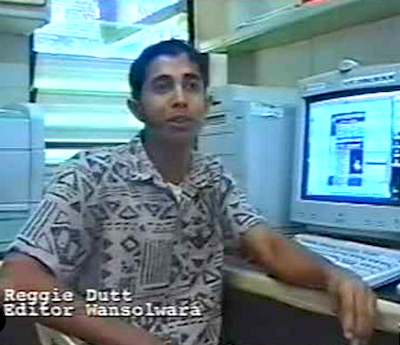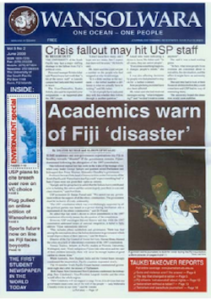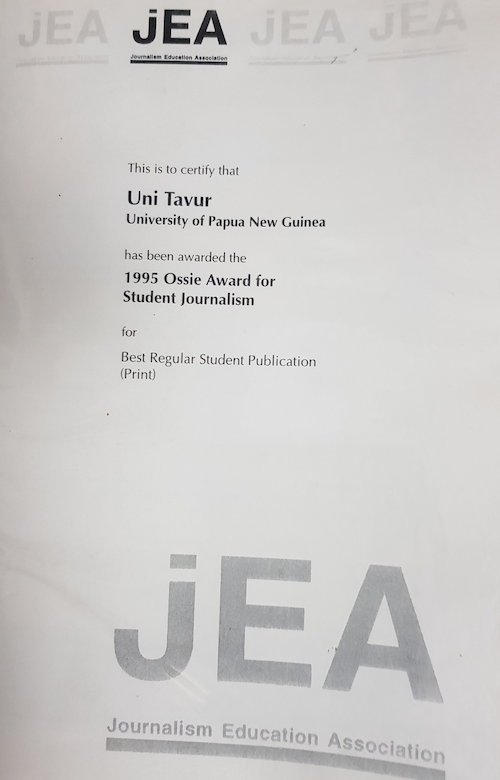By Mark Pearson
The United States has its Pulitzer prizes. Australia has the Walkleys. And journalism education in the region has the Ossies, the Journalism Education Association’s awards recognising excellent journalism produced by students.
The JEA [now JERAA] is Australia-based and most of its members teach at the numerous journalism programs throughout the nation, although each year several students from New Zealand and the Pacific enter the awards.
The awards are named after journalist Osmar S White and are funded from his estate through the generosity of his daughter, journalist and author Sally A White.
Despite the overwhelming Australian membership of the JEA, the awards announced at the association’s annual conference on Queensland’s Sunshine Coast in December 2000 were dominated by entrants from the Pacific and New Zealand.

Journalism students from the University of the South Pacific under the leadership of course coordinator David Robie won two of the major awards and were highly commended in four others for their reporting of the 2000 Fiji coup.
Leading industry personnel judged the awards, and all praised the efforts of the University of the South Pacific students for their coverage of the coup.
Category judge deputy editor of The Age Online, Mike van Niekirk, said the student journalists working on the publication rose to the challenge of providing high quality reports of a dramatic international news event on their doorstep.
“They did so in challenging circumstances and by providing these reports on the internet they were one of the few sources of information at critical times of the events taking place,” he wrote in his judge’s comments.
“As such, the quality of the writing is of a high standard for students. Taken as a body of work it is very impressive.”

There are 12 categories in all.
- Sean Scanlon from the University of Canterbury in New Zealand won the award for best print feature for a postgraduate student as well as the JEA executive’s prize for best story in any medium.
- The Pacific students’ website Pacific Journalism Online devoted to the daily coverage of the coup won the Dr Charles Stuart Prize for best student publication in any medium while the Pacific students’ print edition Wansolwara was a awarded a highly commended in the same category.
- Pacific Journalism Online also won the award for best regular publication.
- The Pacific theme continued, with the University of Queensland’s East Timor project highly commended in the best student publication category.

- Lyn Barnier of the University of Newcastle won the best print news story. Losana McGowan of the University of the South Pacific was highly commended in the category. Judge Chris McLeod, editorial development manager at the Herald and Weekly Times, Melbourne, said the student found herself at the centre of a world-class story: “Her report was a very good descriptive piece about a meeting between students and coup leader George Speight, capturing the feelings of the young people whose safety obviously was at risk.”
- The University of the South Pacific also featured in the high commendations for the best television news story category, with a piece by student Christine Gounder on Fiji soldiers contracting malaria while on tour of duty in East Timor. Gounder presented a balanced report on a newsworthy issue and explored its implications on a national basis, said judge Katherine Swan, a journalist with the ABC in Melbourne. She awarded first prize to Mia Scacciante from Queensland University of Technology for a story on the republic referendum in Australia.
- Swan also judged the award for best television current affairs by an undergraduate student, which went to Tracey Galloway of the University of the Southern Queensland for a report on battery hens.
-

The first of the Ossie awards to go to Pacific students . . . the 1995 award for best publication went to UPNG’s Uni Tavur, supervised by David Robie. News director at K Rock, Geelong, Rob McLennan, juged the best radio news story category, won by Michelle Fraser of the University of Queensland. Tamani Nair of the University of the South Pacific, who “handled a risky situation” with his coverage of the Fiji coup’s first day was highly commended.
Dr Mark Pearson, professor of journalism at Bond University, Queensland, writes a regular “Research and Education” column for the Panpa Bulletin (this publication changed its name to The Newspaper Works in 2012).

